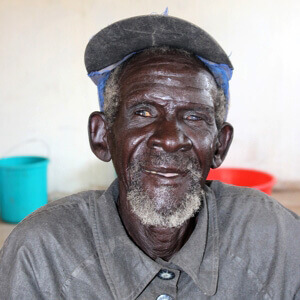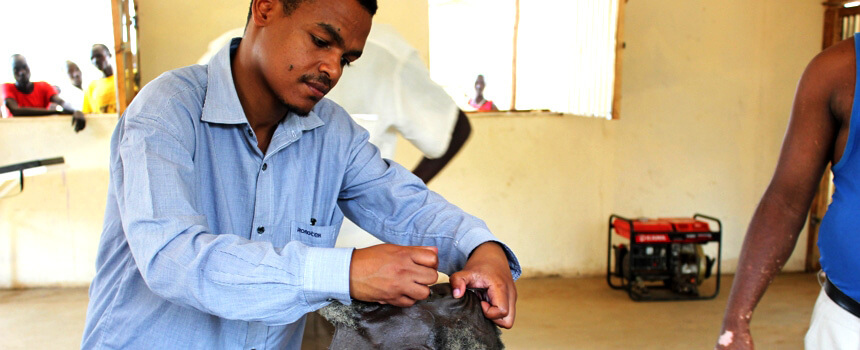 Hopeful vision for the future
Hopeful vision for the future
Eye examinations for elderly refugees in Ethiopia
“When the war broke out, I came to Ethiopia together with my wife, my children and grandchildren,” 76-year-old Khor from South Sudan says. He is one of millions of people who were forced to leave their homes because of the war. The fact that he survived his flight despite of his old age is down to fierce determination to give his family a better and most of all more secure future. Once at the Gambella refugee camp, his eyesight started to deteriorate, and even here, all he could think of was his family: “When I started to go blind I was devastated because I could no longer take care of my family. The doctors restored my eyesight. I would never have thought that was possible! Now I can once again be there for my family,” Khor says.
Necessity
Eye examination for refugees in Ethiopia.
Activity
Free eye examination and, depending on the diagnosis, treatment in the form of eye drops, spectacles or a cataract operation.
Countable effort
Number of refugees that have received an eye examination.
Result
Examinations allow a better diagnosis and targeted treatment for improving vision.
Systemic effect
Improvements in health and quality of life for older refugees.
Background
Since the unrest in 2011, the situation in South Sudan has remained tense. Continuing violence, extreme drought and food shortages drives many to seek refuge in neighbouring Ethiopia. According to the UNHCR, more than 880,000 refugees live in Ethiopia – more than half of them from South Sudan. Living conditions in the camps in Gambella are particularly challenging for the elderly. One of the most prevalent age-related illnesses among refugees, in addition to chronic conditions, is impaired eyesight and eye diseases (Strong et al., 2015). More than a third of people queried in the camp repeatedly stumble or fall because they cannot see an obstacle. Almost a quarter is unable to make out the designs on a bank note. Older people often prioritise their own concerns beneath those of their (younger) family members. This, and the fact that there is little knowledge about treatments, is why they simply accept that their eyesight will deteriorate and they might even go blind. But reduced eyesight significantly limits the abilities of the elderly. Visual impairments also massively reduce the self-assurance and self-esteem and can result in social isolation within the camp.
The good deed
The good deed is explicitly intended for the elderly – a target group that tends to be underrepresented in many projects. The refugees in Ethiopia include about 45,000 older women and men, and most of them have never in their lives had an eye examination. The donation allows older refugees in Ethiopia to have a free eye examination and, depending on the diagnosis, the appropriate treatment – be it eye drops, prescription spectacles or a cataract operation. Improving or regaining eyesight reinforces self-reliance and increases quality of life.

AboutEthiopia
Addis Abeba
105 350 020
1.719
173
Ethiopia is the only country in Africa that was never colonised and the official language Amharic has its own alphabet.
About the organization and further information
Help Age Deutschland e.V.
Website
Further information and source
- Bundeszentrale für politische Bildung, 2018. Äthiopien.
- UNHCR, 2018. Ethiopia.
- Strong, et al., 2015. Health Status and health needs of older refugees from Syria in Lebanon.
- UNHCR, 2018. Ethiopia.
- Bundeszentrale für politische Bildung, 2018. Äthiopien.
- Strong, et al., 2015. Health Status and health needs of older refugees from Syria in Lebanon.




